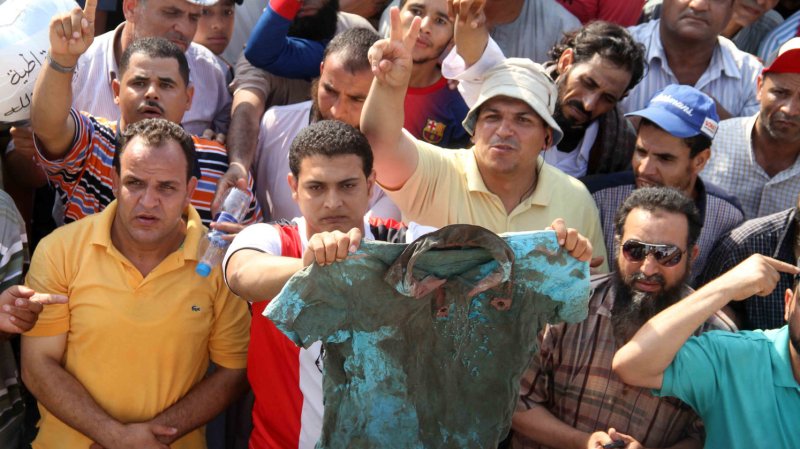Egyptian supporters of ousted president Morsi show a blood-stained shirt of one of the victims during clashes with Republican Guards forces in Cairo, Egypt, July 08, 2013. UPI/Ahmed Jomaa |
License Photo
AMMAN, Jordan, July 18 (UPI) -- Egypt may have dodged a civil war by ousting President Mohamed Morsi, U.S. Secretary of State John Kerry said, refusing again to call the ouster a coup.
"What complicates it obviously is that you had an extraordinary situation in Egypt of life and death, of the potential of civil war and enormous violence, and you now have a constitutional process proceeding forward very rapidly. So we have to measure all of those facts against the law," Kerry told reporters in Amman, Jordan, with Jordanian Foreign Minister Nasser Judeh.
"I'm not going to rush to judgment on it," he said. "I'm going to wait until our lawyers have done their homework on it."
U.S. law requires the Obama administration to stop its more than $1.5 billion in annual aid if it decides the ouster was a coup.
Judeh offered his opinion on the question, saying a military coup is when the military takes over, which he said was not what happened in Egypt.
By contrast, he said, the military intervened "to put the constitutional process back on track."
"And I think that we've got to give them the benefit of the doubt," he said. "They know best. The military in Egypt has been the guarantor of peace and stability in many twists and turns in Egypt's contemporary history."
Kerry said Washington made clear to Cairo its "very deep concern" about the armed removal of Morsi and the suspension of the Egyptian Constitution.
Morsi was unseated July 3 after massive street protests against his rule and put under house arrest, the military said. He hasn't been seen in public or heard from since.
Gen. Abdul Fatah al-Sisi, the armed forces chief and defense minister who led the overthrow, said he was answering popular demands for a new and more inclusive constitution, new presidential elections and a new leadership to replace Morsi's Islamist-leaning government.
Sisi named Supreme Constitutional Court President Adly Mansour as interim president. Mansour then named Sisi deputy to the prime minister, but his powers were not spelled out.
The Muslim Brotherhood's Freedom and Justice Party, which backs Morsi, said Wednesday it would peacefully escalate its protests against what it called an illegitimate government.















